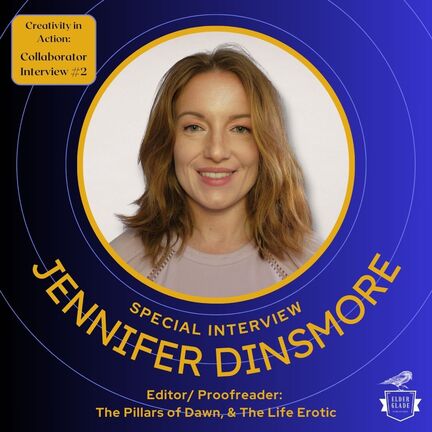I link this moment to the beginning of my love of books. I remember feeling what I can only now describe as both awe and fear—amazed at what their stories offer, and fearful, in a way, of their power. Stories give us countless windows into other worlds, other experiences. They help us to understand and empathize, to teach and inform. And, of course, to entertain and bring joy. Even though I enjoy all the moving parts of crafting a story, and seeing everything come together, it is the final stage, proofreading, that I love the most. I find it so exciting: the book is almost ready, and all that’s needed is a final (finally, the final!) readthrough. I take pride in my ability to ensure all elements are polished and ready to go, ready to enchant readers. EGP: How do you prevent creative burnout? JD: I think some see editing as technical and route, not creative. But writers and editors tap into the same energy—and editing, especially editing fiction, is so much more than indiscriminately applying rules. Editors have to consider the author’s intent, how their word choice reflects the characters and the story, and whether or not a change would add to the work or if it would erase the author’s style. They have to deeply inhabit a creative space in order to do this well, so I think it’s inevitable that we encounter burnout. Over time, I’ve learned to better recognize when I am reaching this point and make sure I take time to rest: when I feel restless or grumpy while working, when I make a lot of simple typos, or when my thoughts start to become sluggish. I try not to push myself and take a break—like a #StetWalk—or sometimes I can feel revived by simply switching tasks. I also do my best to not work on the weekends so I can spend time on my own creative pursuits. EGP: What is your process for feedback? JD: I understand that receiving feedback can be dauting for authors, and at a certain stage of the process too much feedback is a hinder and not a help. With my clients, my main goal is to preserve their voice and vision, so I make edits only where necessary for consistency or clarity. I also include explanations for deeper edits, often referencing the editorial letter, where I provide more context and resources so authors can fully understand my reasoning and then make an informed decision. I also love to celebrate an author’s talent so I include reaction comments in the manuscript as I work. I believe it’s just as helpful for authors to know I was particularly struck by a specific line or image, or if I felt happy, sad, frustrated, moved in some way, where they wanted readers to be moved. At the end of the day, I recognize that it is not my book, and I don’t get to change things just because it’s not how I would write it. My job to make the story, as the author wrote it, the best it can be. EGP: What is the most important part about editing and helping authors to you? JD: I think the most important thing is that an author connects with their chosen audience; we both want readers to feel that same sense of awe I felt all those years ago. So, working with authors to help them realize their creative vision is of the utmost importance. I believe everyone’s voice is valuable, and that we will all deserve a chance to tell our stories. And I will never tire of the thrill I get when I see books on which I’ve worked on the shelves of libraries and bookstores! EGP: What tools or programs do you feel are the most useful in editing or publishing? JD: I love PerfectIt and Word macros! I use them each time I edit, and they go a long in way in helping me ensure consistency and accuracy throughout the manuscript. They also help me save time on small, repeated tasks, which assists in improving my overall efficiency. I also like to use Text Expander for quickly inserting explanations and pointing to further resources as needed. Although I don’t recommend it as replacement for an editor, I like to use the Grammarly web extension to help me catch simple typos and refine phrasing of my emails, social media posts, and the like. There is understandably a lot of chatter right now about AI tools and how they will affect both writing and editing. I’ve delved a little into it myself—trying to understand its capabilities and its limitations—and although I’ve found it useful for helping to generate ideas or gather resources, I realize more just how much it is a tool whose quality and usefulness depends on the knowledge of the user. EGP: What are the most valuable lessons you’ve learned as a fiction editor? JD: That grammar rules are mere guidelines! Well, mostly. Sometimes, a rule is a rule for reason. However, I am a descriptivist not a prescriptivist. Meaning if a line or image is clear and understood by the reader, and is fitting in tone or theme, I feel it’s my job to leave the writing as is. If I applied each and every grammar “rule” indiscriminately, not only would I completely erase the author’s voice but the writing would come across terribly! It would be unclear and hard to read, and devoid of any personality. And isn’t the point of stories to explore the worlds and experiences of others? When you’re starting out as a fiction editor this is something that takes time to learn. Speaking from experience, it’s easy to go overboard on the edits, wanting to prove you know your stuff, without fully considering the author’s intent or the motive behind the character’s choice of words. Even though I rely on my practical knowledge and training to help authors break grammar “rules” effectively, I also rely on my knowledge of stories to know what will best serve the work, and the readers, in the long run. EGP: It can be discouraging when a writer publishes a novel that doesn't have commercial success. What advice do you have for writers who get discouraged? JD: Remember that this is all such a game of luck! What books experience true commercial success surprises publishers all the time. As a bookseller, I can attest to this. There have been times I’m practically tripping over copies of a huge new release the publisher is sure will sell, only to still be tripping over those same piles weeks later as I frantically search for the last copy of some unexpected hit we had way too few of. I’ve also seen great books released quietly, to no big fanfare and that sit gathering dust, suddenly become the hottest title years later. So, you have to decide what success looks like for you. Maybe it’s simply publishing your book and getting it out there, or maybe it’s selling ten copies or getting a 5-star review. The point is to not expect to become “the next Stephen King” or top all the Best Of lists. It’s very unlikely to happen. But that’s okay! YOU DID THE THING! You published a book! You made it further than most, so you’re successful already. Celebrate that. Then, set a succession of small, achievable goals—like a certain amount of copies sold or reviews left on Goodreads—and then celebrate again whenever you hit one. In the meantime, keep creating and work on your next project. Some of your readers have already found you and are impatiently waiting for what you write next! EGP: Editor dream projects or a 10-year plan? JD: According to my new StoryGraph profile, I like books that are reflective, emotional, and dark—so if that’s you, get in touch! I read and have experience with editing many genres, from romance through to horror, but I think it would be really fun to edit a book that plays with structure a little more. My personal favorite example is I Became a Delight to My Enemies by Sara Peters. Otherwise, in ten years, I’d love to be doing what I’m doing now, but on a much bigger scale! Last summer I also had the opportunity to create a webinar for the editorial Freelancers Association, which I rather enjoyed, so right now I am looking into more options to share my knowledge with both authors and fellow editors. Who knows where that will take me! EGP: Thank you, Jennifer!
0 Comments
Leave a Reply. |
Archives
June 2024
CategoriesAll 5 Minute Creativity Adaptation News Collaborators Creativity Challenges Creativity In Action EGP Notes Entertainment News Interviews Launch News Prompts Storytelling Craft Storyverse The Life Erotic The Life Erotic Discovery Journals Twin Flame World Building Writing Craft |
Search by typing & pressing enter



 RSS Feed
RSS Feed